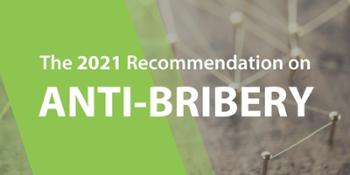Bribery in international business
2021 OECD Anti-Bribery Recommendation
|
Launch event on 9 December 2021 This event on Internationational Anti-Corruption Day brought together three high-level experts to share their views on the Recommendation and its impact for governments, the private sector and civil society. Read more and watch the webcast
High Level Statement by the Parties to the Anti-Bribery Convention
About the Recommendation26/11/2021 - The OECD Anti-Bribery Convention establishes legally binding standards to criminalise bribery of foreign public officials in international business transactions, and provides for a host of related measures to make this effective. It is the first and only international anti-corruption instrument focused on the “supply side” of the bribery transaction. The 2021 Recommendation for Further Combating Bribery of Foreign Public Officials in International Business Transactions complements the Anti-Bribery Convention with a view to further strengthening and supporting its implementation.
The OECD Working Group on Bribery – which brings together the 44 countries Party to the Anti-Bribery Convention – is responsible for monitoring the implementation and enforcement of the Anti-Bribery Convention and Recommendation. In 2018, the Working Group decided to conduct an extensive review of the 2009 Anti-Bribery Recommendation to ensure it continues to reflect the range of good practices, trends and challenges that have emerged in the foreign bribery field over the past ten years. After a rigorous process, including two rounds of extensive consultations with external partners, a stocktaking of ten years of implementation of the 2009 Anti-Bribery Recommendation, multiple written procedures and eight dedicated meetings of the Working Group, the 2021 Anti-Bribery Recommendation was adopted by the OECD Council on 26 November 2021.
With this Recommendation, the Parties to the Anti-Bribery Convention agree to new measures to reinforce their efforts to prevent, detect and investigate foreign bribery. In addition to enhancing the provisions already included in the 2009 Anti-Bribery Recommendation, the 2021 Recommendation includes sections on key topics that have emerged or significantly evolved in the anti-corruption area, including, inter alia, on strengthening enforcement of foreign bribery laws, addressing the demand side of foreign bribery, enhancing international co-operation, introducing principles on the use of non-trial resolutions in foreign bribery cases, incentivising anti-corruption compliance by companies, and providing comprehensive and effective protection for reporting persons. It is one of five OECD Recommendations which make up the strong OECD anti-corruption framework, covering areas such as tax, official development assistance, export credits and state-owned enterprises. |
Download the Recommendation in English
Télécharger la Recommandation en français
|
Key elements of the Recommendation
-
Promote a holistic approach to fighting foreign bribery through new measures to enhance awareness-raising and training of, as well as detection by, key government agencies, including foreign representations, financial intelligence units, tax authorities and official development assistance agencies.
-
Strengthen enforcement of foreign bribery laws, including through proactive detection and investigation of foreign bribery, more effective international co-operation among law enforcement authorities and co-operation in multi-jurisdictional cases.
-
Address the demand side of foreign bribery cases by calling on countries to address the solicitation and acceptance of bribes and better support companies facing bribe solicitation risks.
-
Introduce provisions on the key principles and features of non-trial resolutions.
-
Include extensive provisions to ensure comprehensive and effective protection of whistleblowers in the public and private sectors.
-
Encourage countries to incentivise enterprises to develop internal controls, ethics and compliance programmes or measures to prevent and detect foreign bribery.
Related Documents
